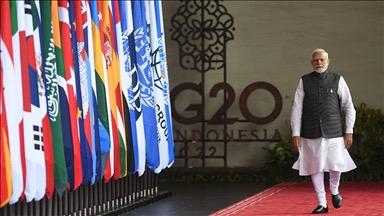India’s Presidency of the G20: Is It an Opportunity to Transform the World into One Family?

By Imane Dernaika Kamali
University Instructor – Political Researcher
“Today, we do not need to fight for our survival – our era needs not be one of war. Indeed, it must not be one,” Modi said in a remark he made to Russian President Vladimir Putin at a regional conference in September, and this declaration paved its way to the final communiqué of the Bali summit.
There is no doubt that our world today is passing through a difficult time full of geopolitical and geo-economic challenges, therefore, effective ways to deal with these risks must be properly reassessed.
With the spread of cross-border issues such as the problems of climate change, terrorism, pandemics and others, we’ve become in great need of multilateral cooperation to ensure equality for all , and achieve world peace.
We failed when we tried to believe that victory and progress for any country could be achieved when this country fights against others over land and resources.
We failed when we fought for these resources for our survival; whereas billions of other people around the world live in scarcity.
We failed when we refrained from humanitarian intervention in wars and massacres, under the pretense of what is so-called “sovereignty” of states, without knowing that true sovereignty is mainly humanitarian and universal responsibility above anything else.
Moreover, the United Nations failed to stop wars and prevent conflicts, because unfortunately, it has remained an authority in the hands of states, instead of being an authority over states, that have refused to cede their sovereignty to a higher one.
After the failure of the United Nations to change political realities, forge consensus between major powers and exterminate conflicts, multilateral institutions emerged, trying to overturn the picture and change the rules of the game in this dark scenario.
Of all the government forums, G20 is undoubtedly a unique platform.
The G20 was formed in 1999 against the backdrop of the financial crisis that hit East and Southeast Asia in the late 1990s, with the aim of securing global financial stability through the involvement of middle-income countries.
The G20 emerged as one of the world’s intergovernmental forums, comprising 20 developed and developing countries: Argentina, Australia, Brazil, Canada, China, France, Germany, India, Indonesia, Italy, Japan, Republic of Korea, Mexico, Russia, Saudi Arabia, South Africa, Turkey, the United Kingdom, the United States, and the European Union.
The bloc represents economies that account for over 85% of global GDP, about 75% of its commerce and 60% of the world’s population.
The presidency of the G20 rotates every year among the members, and the state that holds the presidency, together with the former and next president, forms the so-called “troika.”
This year, India holds the presidency of the Group of 20 until the end of December 2023, and during the month of September, it will hold more than 200 meetings with heads of states and governments to make India’s G-20 Presidency one of healing, harmony and hope.
Here, many questions could be raised: Can India really abolish the logic of wars and conflicts rooted in our world? Can It push the world to reform our current economic system, which only accentuates extremes of wealth and poverty ? Can it encourage all to act together to advocate the fundamental “oneness” and ensure human security?
In fact, India has worked hard to secure wider representation of developing countries and emerging economies in multilateral institutions, and on behalf of the Global South , India has raised their problems and grievances several times in multilateral forums, which means that India will certainly use its presidency this year to highlight issues of interest to developing countries and emerging economies of the southern world by putting them to the top table of the G20.
To design the logo of G20, India chose the lotus flower, which symbolizes the Indian culture, history and heritage ,and it used the colours of saffron, white, green and blue, the colours of the Indian national flag. The seven petals in the logo made a reference to the seven seas, and the seven continents converged in India’s 2023 group, and sitting around the lotus flower represents India’s vision of the world as one family. This is the approach that India will take to let humanity emerge victorious from its challenges.
India derived the title of the Group of Twenty 2023: “One Land, One Family, One Future”, from the Sanskrit phrase: “ Vasudhaiva Kutumbakam” which means “The world is one family”, found in Hindu texts and engraved on the entrance to the Parliament Hall of India.
President Modi considers the theme of India G20, not a mere theme, but a mission and responsibility; it is the responsibility of India to address what it considers urgent issues in the world, including climate change, food security, health care, and technology.
On this basis, President Modi emphasised that as in our own families, those whose needs are the greatest must always be our first concern, G20 priorities will also be set to fellow partners in the global South, whose voice often goes unheard.
Moreover, India’s hosting of Chinese President Xi Jinping in New Delhi next year will be a step forward towards peace, especially since relations between China and India are currently at a standstill because of their territorial disputes over their common border in the Himalayas.
The expected meeting between the Russian and Ukrainian presidents, Vladimir Putin and Volodymyr Zelensky, in New Delhi on the sidelines of the G20 summit is an occasion to create a bridge of convergence between the warring countries through diplomacy and dialogue.
Finally, in the current geopolitical context full of challenges and increasing tensions between countries, and due to the increasing lack of credibility in multilateral institutions, India’s task sounds extremely difficult.
It remains for India- which represents a microcosm of the world with one-sixth of the world’s population, and which has wisely managed with the Gandhian thinking to grow into the largest democracy and the fifth largest economy in the world- to prove whether its assumption of the presidency of the G20 is just a routine change of presidency in an international multilateral institution , or a golden opportunity to transform the world into one family.

